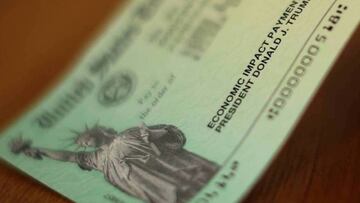Second stimulus check in US: further financial aid "imperative"
As the coronavirus pandemic continues, economists at the Washington Center for Equitable Growth say Americans must get financial relief such as a second stimulus check.

It is "imperative" that American families hit hard by the financial effects of the coronavirus receive "substantial" additional income support such as a second stimulus check, says the Washington Center for Equitable Growth (WCEG).
In a blog post published on the WCEG’s website this month, the economic policy analysts Michael Garvey and Claudia Sahm say the financial assistance given to people in the US as part of March’s CARES Act had a significant impact on helping households to make ends meet - and add that such aid "should not have ended".
CARES Act provided stimulus checks, $600 benefits boost
Under the CARES Act, a $2.2-trillion relief bill passed in March, Americans earning under $99,000 a year received one-time stimulus checks of up to $1,200. The legislation also provided an unemployment benefits boost of $600 a week as part of the Federal Pandemic Unemployment Compensation (FPUC) scheme, but this program expired at the end of July.
Talks between Republicans and Democrats over a new relief package featuring further financial assistance of this kind have stalled, with enhanced unemployment benefits proving a particular stumbling block in negotiations between House Speaker Nancy Pelosi (D-Calif.) and Senate Minority Leader Chuck Schumer (D-NY) on one side, and Treasury Secretary Steve Mnuchin and White House Chief of Staff Mark Meadows on the other.
Trump benefits boost misses out many and may not last long
While Pelosi and Schumer have pushed to extend the $600 weekly amount, Mnuchin and Meadows have sought to reduce this figure in line with the provisions of the HEALS Act, Republican senators’ proposal for the next stimulus bill. Due to the impasse, President Donald Trump signed an executive order in August seeking to provide $300/$400 in extra benefits, which have started to go out in some states in the US.
However, Forbes reports that large numbers of claimants across the US face something of a wait for this extra money, as "many states continue to modify their computer systems so that they can begin processing the enhanced unemployment benefits".
What's more, MarketWatch notes that around one million Americans who were eligible for the CARES Act boost will not qualify for this benefits supplement, as they do not receive at least $100 in regular unemployment insurance. In addition, the fund used to pay for these extra benefits may run out within the space of just six weeks, the Wall Street Journal says.
Meanwhile, there appears to be agreement between Republicans and Democrats that a second round of stimulus checks of $1,200 should be sent out to eligible Americans - but as negotiators haggle over the size of a relief package, exactly when a renewed batch of direct payments might actually arrive remains extremely unclear.
- Second stimulus package: when could new relief bill be passed?
- Stimulus check payment: what are the IRS alternatives?
Coronavirus pandemic sees unemployment surge in US
Around 60 million people in the US have filed first-time unemployment-insurance claims since March, with the economic effects of the coronavirus causing the country's jobless rate to rise sharply from its pre-pandemic levels. Unemployment soared to 14.7% in April and, though it has now fallen to 8.4%, this remains significantly higher than February’s rate of 3.5%.
Citing a recent study that discusses the impact of Covid-19 on jobs, Garvey and Sahm note that ethnic minorities in the US have been particularly badly affected by the downturn in employment, with 30% of black families and 40% of Latino families losing out on at least one paycheck by June, compared to 20% of white households.
In their WEGC blog post, Garvey and Sahm also point to the results of research carried out by Columbia University’s Center on Poverty and Social Policy (CPSP), which found in June that the percentage of American families suffering from economic hardship could have risen by approximately 4% without the income support provided by the CARES Act.
However, the CPSP also warned that "additional income support will be needed" amid increased unemployment rates in the US.
"Congress must do more"
Speaking in the same vein, Garvey and Sahm have called for US lawmakers to agree a new stimulus package that offers struggling Americans the kind of financial aid that was provided by the CARES Act. "The CARES Act, including direct rebates and enhanced jobless benefits, was integral for families and small business owners, especially those with less income and marginalized groups, to weather the onset of the coronavirus recession. It is imperative that substantial additional assistance be provided to those in need. We are facing a pandemic that threatens our well-being in countless ways, perhaps for years to come.
Related stories
"Congress must do more to support all families and keep us safe."
Live coverage of the coronavirus pandemic
As of 08:30 ET on Monday, the coronavirus pandemic had led to 6,277,902 cases and 188,942 deaths in the United States, according to data compiled by Johns Hopkins University. You can follow live coverage of the Covid-19 crisis in the US - the world’s worst-affected country - by reading our dedicated live blog.

